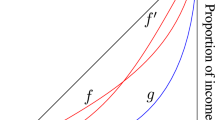Summary
This paper deals with the problem how to measure the degree of inequality implied by a certain distribution of personal incomes. Traditional approaches to this subject, including statistical and welfare-based indicators, possess some important short-comings. As an alternative procedure this paper proposes the use of explicit normative concepts, by defining indicators which measure the divergence between an actual income distribution and a target or desirable one. Several indicators are given. The problem how to specify a target distribution is discussed, and a tractable procedure is indicated. This is applied to both actual and simulated income data. The examples serve only as illustrations of the approach proposed and use of the indicators for actual policy evaluation still requires more data.
Similar content being viewed by others
References
Aigner, D. J. and A. J. Heins, ‘A Social Welfare View of the Measurement of Income Inequality,’Review of Income and Wealth, XIII (1967), pp. 12–25.
Atkinson, A. B., ‘On the Measurement of Inequality,’Journal of Economic Theory, II (1970), pp. 244–263.
Atkinson, A. B.,Unequal Shares, Wealth in Britain, London, 1974.
Atkinson, A. B.,The Economics of Inequality, Oxford, 1975.
Bartels, C. P. A. and H. van Metelen,Een vergélqkende empirische analyse van inkomensongelykheidsmaatstaven, Research Memorandum no. 13, Vrije Universiteit, Amsterdam, 1974.
Bartels, C. P. A. and P. Nijkamp, ‘An Empirical Welfare Approach to Regional Income Distributions. Alternative specifications and estimates of income inequality measures,’Socio-Economic Planning Sciences, X (1976), pp. 117–128.
Bartels, C. P. A.,Economic Aspects of Regional Welfare: Income Distribution and Unemployment, Leiden, 1977.
Benzécri, J. P. (et collaborateurs),L'analyse des donnees 1, La taxinomie, 2 L'analyse des correspondances, Paris, 1973.
Behrens, J. and E. Smolensky, ‘Alternative Definitions of Income Redistribution,’Public Finance, XXVIII (1973), pp. 315–332.
Béteille, A. (ed.),Social Inequality, London, 1972, (repr.).
C.B.S.,Inkomensverdeling 1957 en vermogensverdeling 1958, Zeist, 1962.
C.B.S.,Inkomensverdeling 1967 en vermogensverdeling 1968, 's-Gravenhage, 1972.
C.B.S.,Sociale maandstatistiek, (juni), 's-Gravenhage, 1975.
C.P.B.,De personele inkomensverdeling 1952-1967, C.P.B. monografie no. 19, 's-Gravenhage, 1975.
Dagum, C., ‘Scheme for a Methodology of Research in Economics,’Working Paper 7517, Department of Economics. University of Ottawa, 1975.
Dahrendorf, R., ‘On the Origin of Inequality among Men’, in: Béteille, A. (ed.),Social Inequality, London, 1972, pp. 16–44.
Dalton, H., ‘The Measurement of the Inequality of Incomes,’Economic Journal, XXX (1920) pp. 348–361.
Daniel, T. E., ‘A Revised Concept of Distributional Equity,’Journal of Economic Theory, XI (1975), pp. 94–109.
Fair, R. C., ‘The Optimal Distribution of Income,’Quarterly Journal of Economics, LXXXV (1971), pp. 551–579.
Fisher, F. M. and J. Rothenberg, ‘How Income Ought To Be Distributed: Paradox Lost,’Journal of Political Economy, LXIX (1961), pp. 162–180.
Fisher, F. M. and J. Rothenberg, ‘How Income Ought To Be Distributed: Paradox Enow,’Journal of Political Economy, LXX (1962), pp. 88–93.
Gunther, W. D. and C. G. Leathers (1975), ‘Trends in Income Inequality in the South, 1950 to 1970,’Growth and Change, VI (1975), pp. 19–22.
Interimnota inkomensbeleid (1975), (zitting 1974–1975 Tweede Kamer der Staten Generaal).
Kolm, C. S.,Justice et équité, Centre National de la Recherche Scientifique, Paris, 1972.
Kravis, I. B., ‘International Differences in the Distribution of Income,’Review of Economics and Statistics, XLII (1960), pp. 408–416.
Kullback, S.,Information Theory and Statistics, New York, 1959.
Love, R. F. and J. G. Morris, ‘Solving Constrained Multi-facility Location Problems Involvingl p Distances Using Convex Programming,’Operations Research, XXIII (1971), pp. 581–587.
Meade, J. E. and Ch. J. Hitch, ‘How should Income be Distributed?,’ in: Budd (ed.),Inequality and Poverty, New York, 1967.
Naylor, T.H., J.L. Balintfy, D. S. Burdick, K. Chu,Computer Simulation Techniques, New York, 1966.
Pen, J.,Income Distribution, London, 1974.
Polanyi, G. and J. B. Wood,How Much Inequality, London, 1974.
Ranadive, K. R., ‘The “Equality” of Incomes in India,’Bulletin of the Oxford University Institute of Economics and Statistics, XXVII (1965), pp. 119–134.
Roberti, P., ‘Income Distribution: A Time-series and a Cross-section Study,’Economic Journal, LXXXIV (1974), pp. 629–638.
Sattinger, M., ‘Comparative Advantage and the Distributions of Earnings and Abilities,’Econometrica, XLIII (1975), pp. 455–468.
Sen, A., ‘Informational Bases of Alternative Welfare Approaches, Aggregation and Income Distribution,’Journal of Public Economics, III (1974), pp. 387–403.
Staehle, H., ‘Ability, Wages, and Income,’Review of Economics and Statistics, XXV (1943), pp. 77–87.
Strotz, ‘How Income Ought To Be Distributed. A Paradox in Distributive Ethics,’Journal of Political Economy, LXVI (1958), pp. 189–205.
Strotz, R. H., ‘How Income Ought To Be Distributed: Paradox Regained,’Journal of Political Economy, LXIX (1961), pp. 271–278.
Theil, H. R.,Economics and Information Theory, Amsterdam, 1967.
Tinbergen, J., ‘On the Theory of Income Distribution,’Weltwirtschaftliches Archiv, LXXVII (1956), pp. 155–175.
Tinbergen, J.,An Interdisciplinary Approach to the Measurement of Utility or Welfare. Fifth Geary Lecture, The Economic and Social Research Institute, Dublin, 1972.
Tinbergen, J.,Income Distribution, Analysis and Policies, Amsterdam, 1975.
Van Praag, B., ‘The Welfare Function of Income in Belgium: An Empirical Investigation,’European Economic Review, II (1971), pp. 337–369.
Van Praag, B. and A. Kapteyn, ‘Further Evidence on the Individual Welfare Function of Income: An Empirical Investigation in the Netherlands,’European Economic Review, IV (1974), pp. 33–62.
Wallich, H. C., ‘Inequality and Growth,’ in: Budd (ed.),Inequality and Poverty, New York, 1967, pp. 14–26.
Weisskopf, R., ‘Income Distribution and Economic Growth in Puerto Rico, Argentina and Mexico,’Review of Income and Wealth, XVI (1970), pp. 303–332.
Wiles, P.,Distribution of Income: East and West, Amsterdam, 1974.
Author information
Authors and Affiliations
Additional information
The author wishes to thank Henk van Metelen and Arend Stemerding for research assistance, and Simon Kuipers, Peter Nijkamp and Jan Tinbergen for their stimulating remarks on an earlier draft of this paper. Of course, they are not responsible for errors and do not necessarily share the opinion expressed in this paper. This paper has been presented at the Econometric Society European Meeting, Helsinki, August 1976. An extensive discussion of different aspects of income distribution is contained in Bartels (1977).
Rights and permissions
About this article
Cite this article
Bartels, C.P.A. Explicit normative measurement of the degree of income inequality. De Economist 125, 360–382 (1977). https://doi.org/10.1007/BF01479117
Issue Date:
DOI: https://doi.org/10.1007/BF01479117




